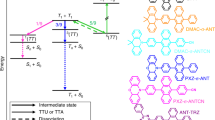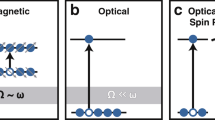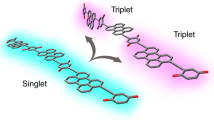Abstract
IT has long been known from experimental evidence1 that triplet states in the spectra of two electron systems differ from the corresponding singlet states in their behaviour to electron impact. The probability of excitation of a triplet level has a sharp maximum for electron energies just above the excitation potential, whereas in the case of singlets the maximum probability is not sharp, and occurs at energies considerably beyond the resonance potential; also, for high velocities the triplet excitation is negligible compared with the singlet excitation. The difference must lie in the fact that the triplets can only be excited from the ground state by electron exchange, and Oppenheimer2 has shown in general how this may be approximately calculated.
This is a preview of subscription content, access via your institution
Access options
Subscribe to this journal
Receive 51 print issues and online access
$199.00 per year
only $3.90 per issue
Buy this article
- Purchase on Springer Link
- Instant access to full article PDF
Prices may be subject to local taxes which are calculated during checkout
Similar content being viewed by others
References
Hanle, Zeit. f. Phys., 56, 94; 1930. Skinner and Lees, NATURE, 123, 836 ; 1929. Schaffernicht, Zeit. f. Phys., 62, 106; 1930.
Phys. Rev., 32, 361 ; 1928.
Eckart, Phys. Rev., 36, 878 ; 1930.
Author information
Authors and Affiliations
Rights and permissions
About this article
Cite this article
MASSEY, H., MOHR, C. Excitation Probabilities of Singlet and Triplet States. Nature 127, 234–235 (1931). https://doi.org/10.1038/127234a0
Issue Date:
DOI: https://doi.org/10.1038/127234a0
Comments
By submitting a comment you agree to abide by our Terms and Community Guidelines. If you find something abusive or that does not comply with our terms or guidelines please flag it as inappropriate.



